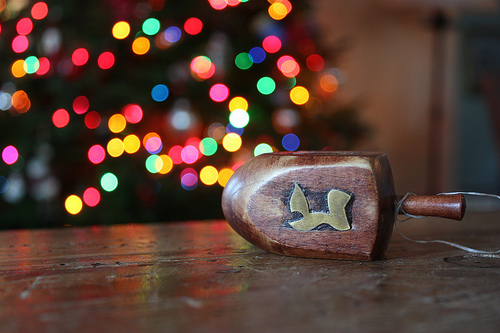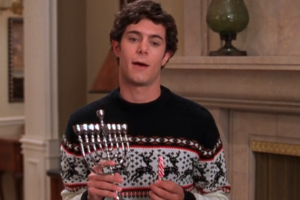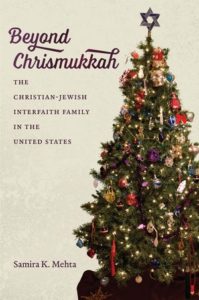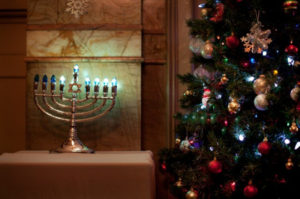The December Dilemma: Less Oy, More Joy
How do Jewish-Christian interfaith families navigate the holiday season?
 Spin the dreidel by the light of the Christmas tree this year because Hanukkah and Christmas overlap! The eight-day Hanukkah celebration starts December 22 and ends December 30. Christmas is, as it always is, on December 25. You might think this would be a joyous occasion for Jewish-Christian interfaith families. Hanukkah and Christmas, together again! Families can light the menorah underneath the stockings, set out sufganiyot [jelly doughnuts served at Hanukkah] for Santa along with milk and cookies, and send holiday cards with sentiments like “‘Tis the season, whatever the reason!”
Spin the dreidel by the light of the Christmas tree this year because Hanukkah and Christmas overlap! The eight-day Hanukkah celebration starts December 22 and ends December 30. Christmas is, as it always is, on December 25. You might think this would be a joyous occasion for Jewish-Christian interfaith families. Hanukkah and Christmas, together again! Families can light the menorah underneath the stockings, set out sufganiyot [jelly doughnuts served at Hanukkah] for Santa along with milk and cookies, and send holiday cards with sentiments like “‘Tis the season, whatever the reason!”

The OC television show
In America, the fusion of Christmas and Hanukkah even has its own name, “Chrismukkah,” made popular by the early 2000s television show The OC. The show’s main character, Seth Cohen, a child of a Jewish father and Presbyterian mother, describes Chrismukkah as eight days of presents, followed by one day with tons of presents. The term was so popular that Chrismukkah was one of Time magazine’s words of the year in 2004. Consumerism quickly followed, with a slew of kitschy items hitting the market, ranging from coffee table books to Chrismukkah cards from Hallmark and American Greetings. There are Chrismukkah ornaments and Chrismukkah recipes. The recipes include the inglorious Passion of the Iced, a Long Island Iced Tea pulled from stereotypes about Jews on Long Island and “the Passion of the Christ,” which, confusingly, should be associated with Easter, not Christmas. But those details are not what drive Chrismukkah commercialism. Whether these products are “a merry-mishmash” or a problematic blend of stereotypes, they are principally consumption oriented. They avoid many of the traditions and stories that root these holidays in their historical and theological contexts. The creators of Chrismukkah commodities are often deeply secular. They are looking to keep the fun elements of Christmas and Hanukkah that might easily unite Jewish-Christian interfaith families without stumbling into the murkier waters of theological or historical differences.
For many interfaith families, however, the holiday season can be more fraught than Chrismukkah would suggest. Since the 1970s, when American Jews started to marry Christians in large numbers, the question of whether interfaith families should celebrate Hanukkah, Christmas, both, or neither, has been referred to as the “December dilemma.” For the past four decades, countless rabbis, ministers, and relationship experts have debated if it is acceptable for Jews and Christians to intermarry and, if they do, how they should navigate competing religious and cultural demands.
As the interfaith marriage rate began to rise, clergy responded to the phenomenon in several ways. Interfaith marriage was particularly troubling to many in the Jewish community because of dwindling demographics. Jews make up less than 2% of the American population and less than 0.2% of the world population. Jewish leaders worried that interfaith marriage would damage Jewish numbers beyond repair. As a result, many rabbis refused to perform interfaith marriages and many liberal Protestant clergy actually encouraged interfaith couples to stay connected to Jewish communities. The few rabbis who would marry interfaith couples typically expected those couples to maintain a Jewish home. More often than not, those rabbis, who were members of the Reform movement—both the largest and most liberal of the Jewish movements—were not asking interfaith couples to do things like keep kosher or keep the Sabbath. Rather, they were asking them to “not do Christian things,” that is, to abstain from Christmas, at least in their homes. Christian spouses in interfaith marriages were told they could celebrate Christmas with their birth families, but they were not to decorate for, or celebrate, Christmas in their own homes. The absence of Christmas became the litmus test for whether or not the interfaith couple was, in fact, keeping a Jewish home.
For some interfaith families giving up Christmas worked well. The couples, and their children, were happy with their Jewish lives and identities. Some made a big deal out of Hanukkah, which is a surprisingly minor holiday in the Jewish liturgical calendar, but which serves many Jewish families (interfaith and not) as a festive holiday in the midst of massive cultural Christmas cheer. Others enjoyed Christmas celebrations with their birth families and did not object to keeping the yuletide trappings out of their own homes.
 Other interfaith families, however, found giving up Christmas difficult. While conducting research for my book, Beyond Chrismukkah: The Christian-Jewish Interfaith Family in America, I discovered that spouses from Christian backgrounds sometimes became depressed living in homes in which Christmas was forbidden. Other times I learned about spouses who suddenly found themselves with nowhere to celebrate Christmas after their parents had died and they had promised not to celebrate Christmas in their homes. Many Christian women, married to Jewish men, reported that they resented working hard to maintain their husband’s Jewish traditions while their own customs were banned from the home.
Other interfaith families, however, found giving up Christmas difficult. While conducting research for my book, Beyond Chrismukkah: The Christian-Jewish Interfaith Family in America, I discovered that spouses from Christian backgrounds sometimes became depressed living in homes in which Christmas was forbidden. Other times I learned about spouses who suddenly found themselves with nowhere to celebrate Christmas after their parents had died and they had promised not to celebrate Christmas in their homes. Many Christian women, married to Jewish men, reported that they resented working hard to maintain their husband’s Jewish traditions while their own customs were banned from the home.
The prohibition against celebrating Christmas has been enforced in a number of ways, but Hebrew School has been a particularly common place where people monitored Christmas observance. One woman told me that she grew up celebrating Christmas with her Jewish mother and Irish Catholic father in New York City. Even after her parents divorced, she continued celebrating Christmas with her Jewish mother. Christmas, to her, was New York—the window displays at Saks Fifth Avenue, ice-skating by the Rockefeller Center Christmas Tree, seeing Santa Claus at the 34th Street Macys. She never questioned her Jewish identity. Her parents had agreed that she would be raised Jewish; her father was not a practicing Catholic and, because Judaism is matrilineal, she was Jewish in the eyes of all Jewish religious leaders. She grew up, married a Jewish man, and continued to celebrate Christmas until her daughter’s Hebrew School director told her she needed to stop. The Hebrew School director insisted Christmas would confuse her daughter’s sense of Jewish identity. Though the mother had grown up celebrating Christmas and did not feel in the least confused, she complied. And even though she had committed to Judaism in many other ways, her community found her celebration of and love for Christmas to be a significant problem that threatened her child’s connection to the Jewish people.
Another Jewish woman I interviewed married a Christian man. Together, they joined a Unitarian Universalist congregation and chose to decorate their home for Christmas and celebrate Hanukkah. Every year, her Jewish sister refused to enter their home while it was decorated for Christmas. Not only did her sister and family skip all Christmas celebrations, they insisted that she take down her tree and put away the ornaments before hosting their annual New Year’s Day brunch. Her sister’s refusal to enter her home meant that she could never host their family’s Hanukkah gathering, and every year she was reminded of her sister’s disapproval. Although celebrating both Christmas and Hanukkah worked for these two women, their communities and birth families registered strong disapproval of their choices, such that the first woman ceased to celebrate Christmas and the second spent the entire month of December upset by her sister’s discontentment.
 Christmas, then, is often a sticky time for interfaith families. Plenty of people in interfaith families, even those who actively identify as Jewish, do, in fact, celebrate Christmas. Interfaith families also often celebrate Hanukkah. But over and over again, despite how important “Chrismukkah” has become as a cultural phenomenon, when completing the research for my book, I found very few people who actually celebrated the combined holiday of Chrismukkah. Interfaith families that are committed to doing both Hanukkah and Christmas, such as a Mormon woman and Jewish man I met, are often careful to make sure that their children know the distinct stories of both holidays. Because the Jewish husband has what he describes as a “Jewish allergy” to Christmas trees, they do not have a tree in their home. The Mormon wife explained that a tree is not essential to her, and therefore not worth asking her husband to experience discomfort. Christ, however, is essential to her and so they have a nativity scene. Their children know the Christmas story, from the Gospel of Luke, and also the Hanukkah story. They have chosen to avoid the gift giving frenzy that both holidays can invite. Other families I met are more secular in their observances, downplaying Christ in favor of more general messages of peace on Earth and avoiding the commonly-held idea that the Hanukkah story is a fight against assimilation in favor of emphasizing Jewish survival. Regardless of the holidays’ messages, interfaith families, like other families, fill this season with family recipes, family stories, and family visits. They watch Christmas specials, wear ugly sweaters, and light menorahs that children made out of modeling clay in preschool. The holidays in these homes run parallel with each other and overflow with meaning, tradition, and ritual.
Christmas, then, is often a sticky time for interfaith families. Plenty of people in interfaith families, even those who actively identify as Jewish, do, in fact, celebrate Christmas. Interfaith families also often celebrate Hanukkah. But over and over again, despite how important “Chrismukkah” has become as a cultural phenomenon, when completing the research for my book, I found very few people who actually celebrated the combined holiday of Chrismukkah. Interfaith families that are committed to doing both Hanukkah and Christmas, such as a Mormon woman and Jewish man I met, are often careful to make sure that their children know the distinct stories of both holidays. Because the Jewish husband has what he describes as a “Jewish allergy” to Christmas trees, they do not have a tree in their home. The Mormon wife explained that a tree is not essential to her, and therefore not worth asking her husband to experience discomfort. Christ, however, is essential to her and so they have a nativity scene. Their children know the Christmas story, from the Gospel of Luke, and also the Hanukkah story. They have chosen to avoid the gift giving frenzy that both holidays can invite. Other families I met are more secular in their observances, downplaying Christ in favor of more general messages of peace on Earth and avoiding the commonly-held idea that the Hanukkah story is a fight against assimilation in favor of emphasizing Jewish survival. Regardless of the holidays’ messages, interfaith families, like other families, fill this season with family recipes, family stories, and family visits. They watch Christmas specials, wear ugly sweaters, and light menorahs that children made out of modeling clay in preschool. The holidays in these homes run parallel with each other and overflow with meaning, tradition, and ritual.
In the end, most interfaith families I met keep their Christmas and Hanukkah celebrations separate. In these homes, Christmas gets its time, and Hanukkah gets its own time. The whole point of the holidays, for these families, is to honor the traditions, stories, souvenirs, and rituals that their parents and grandparents found important, be those hand-knit stockings or hand-grated latkes (potato pancakes), stories of the birth of the Jesus, or stories about the survival of a small but scrappy group of ancient Jews against all odds.
The result is that when Christmas and Hanukkah overlap, years like this one pose a challenge for interfaith families. It is one thing to light the menorah in the shadow of the Christmas tree because you already have it up. It is quite another to hit pause on the Christmas celebrations so you can light the menorah for the fourth night in a row. These overlaps do not, however, necessarily mean an unhappy holiday—just one that needs a little bit of thought. And increasingly, interfaith families find ways to keep December from being a dilemma.
Samira K. Mehta is an Assistant Professor of Women and Gender Studies and of Jewish Studies at the University of Colorado, Boulder. Her first book, Beyond Chrismukkah: The Christian-Jewish Interfaith Family in America (University of North Carolina Press, 2018) was a National Jewish Book Award finalist. Her current project, God Bless the Pill: Contraception and Sexuality in Tri-Faith America examines Jewish, Catholic, and Protestant debates about contraception, population control, and eugenics from the mid-twentieth century to the present.
***
Published with support from the Henry R. Luce Initiative on Religion in International Affairs.